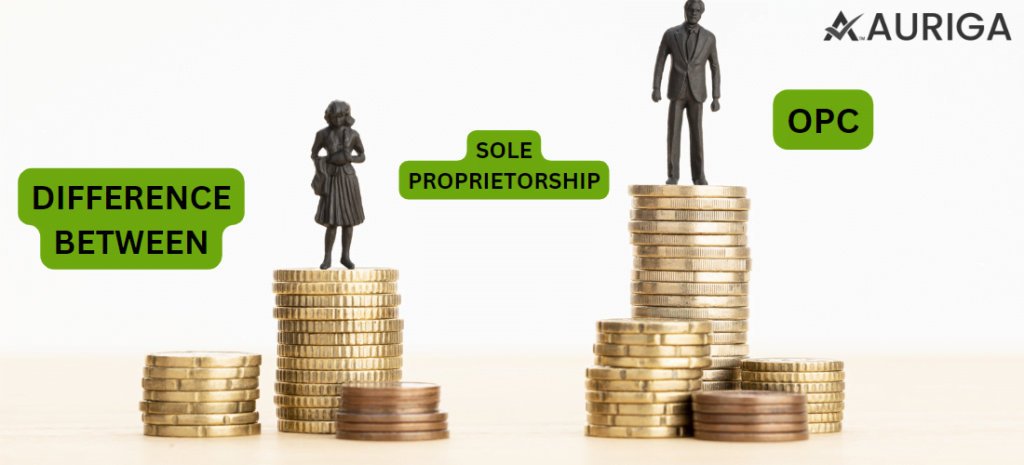DIFFERENT BETWEEN SOLE PROPRIETORSHIP AND ONE PERSON COMPANY?
Introduction
Toggle
DIFFERENT BETWEEN SOLE PROPRIETORSHIP AND ONE PERSON COMPANY?
INTRODUCTION
A sole proprietorship and a one-person company (OPC) are both business structures that can be owned and operated by a single individual. However,
SOLE PROPRIETORSHIP
A sole proprietorship is a business owned and operated by one person. The owner is personally liable for all debts and obligations of the business. Sole proprietorships are the simplest and most common form of business ownership.
Here are some of the key features of a sole proprietorship:
- Ownership: A sole proprietorship is not a legal entity, meaning that the owner and the business are considered to be one and the same. This means that the owner is personally liable for all debts and obligations of the business.
- Liability: As mentioned above, the owner of a sole proprietorship is personally liable for all debts and obligations of the business. This means that if the business fails, creditors can seize the owner’s personal assets, such as their home, car, and savings.
- Taxation: The income of a sole proprietorship is taxed as personal income on the owner’s individual tax return. This means that the owner must pay self-employment taxes, which include Social Security and Medicare taxes.
- Compliance requirements: Sole proprietorships have fewer compliance requirements than other types of businesses, such as corporations and limited liability companies (LLCs). For example, sole proprietorships are not required to file annual reports or hold board meetings
ONE PERSON COMPANY
A one-person company (OPC) is a company that is owned and managed by a single person. It is a separate legal entity from its owner, which means that the owner’s personal assets are protected from the debts and obligations of the business. OPCs are governed by the Companies Act, 2013.
Here are some of the key features of a OPC:
- Ownership: An OPC can only have one member. The member is also the director of the company.
- Liability: The member of an OPC is only liable for the amount of their investment in the company. This means that if the business fails, creditors cannot seize the member’s personal assets.
- Taxation: The income of an OPC is taxed as corporate income. This means that the company pays taxes on its profits. However, the member of an OPC may be able to take advantage of certain tax benefits, such as paying lower taxes on dividends.
- Compliance requirements: OPCs are subject to a number of compliance requirements, such as filing annual reports and holding board meetings. However, the compliance requirements for OPCs are less than those for other types of companies, such as private limited companies.
here are some of the key features of a sole proprietorship:
- Ownership: A sole proprietorship is owned and operated by one person. The owner is personally liable for all debts and obligations of the business.
- Liability: The owner of a sole proprietorship is personally liable for all debts and obligations of the business. This means that if the business fails, creditors can seize the owner’s personal assets, such as their home, car, and savings.
- Taxation: The income of a sole proprietorship is taxed as personal income on the owner’s individual tax return. This means that the owner must pay self-employment taxes, which include Social Security and Medicare taxes.
- Compliance requirements: Sole proprietorships have fewer compliance requirements than other types of businesses, such as corporations and limited liability companies (LLCs). For example, sole proprietorships are not required to file annual reports or hold board meetings.
some of the benefits of forming a sole proprietorship:
- Simple to set up and maintain: Sole proprietorships are relatively easy to set up and maintain. There is no need to file any formal paperwork with the government, and there are no ongoing reporting requirements.
- Low cost: Sole proprietorships are relatively inexpensive to set up and operate. There are no ongoing registration fees or annual reports to file.
- Tax benefits: Sole proprietors can take advantage of certain tax benefits, such as deducting business expenses from their personal income taxes.
- Flexibility: Sole proprietors have a great deal of flexibility in how they run their businesses. They can make decisions quickly and easily, and they are not bound by the same rules and regulations as other types of businesses.
some of the benefits of forming a One Person Company (OPC):
- Limited liability: The member of an OPC is only liable for the amount of their investment in the company. This means that if the business fails, creditors cannot seize the member’s personal assets.
- Separate legal entity: An OPC is a separate legal entity from its owner. This means that the owner’s personal assets are protected from the debts and obligations of the business.
- Tax benefits: The income of an OPC is taxed as corporate income. However, the member of an OPC may be able to take advantage of certain tax benefits, such as paying lower taxes on dividends.
- Flexibility: OPCs offer a great deal of flexibility in how they are run. They can make decisions quickly and easily, and they are not bound by the same rules and regulations as other types of businesses.
- Easy to set up and maintain: OPCs are relatively easy to set up and maintain. There is no need to file any formal paperwork with the government, and there are no ongoing reporting requirements.
- Good for small businesses: OPCs are a good option for small businesses that are looking for limited liability protection and flexibility.
- More attractive to investors: OPCs may be more attractive to investors than sole proprietorships or partnerships, as they offer more protection for their investment.



